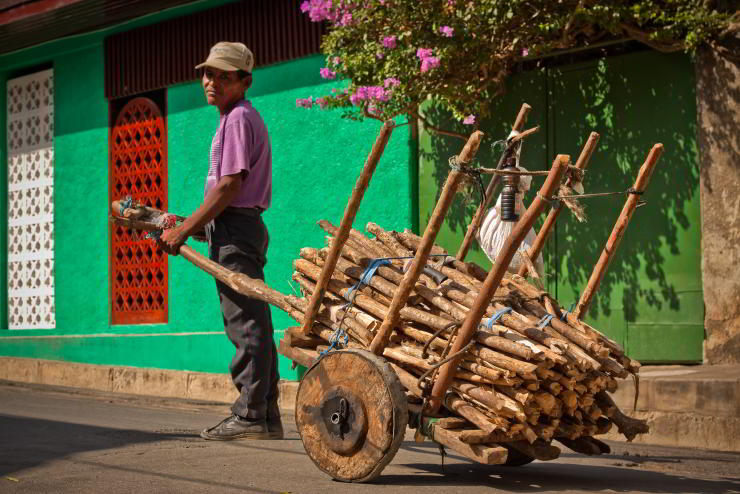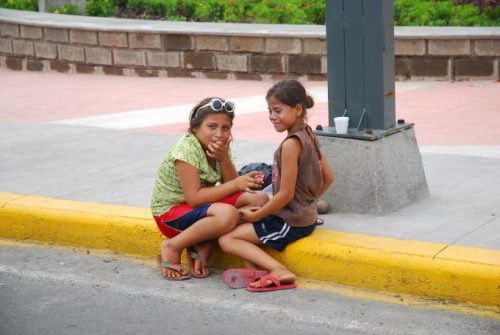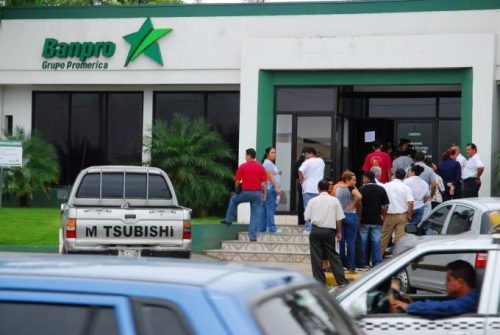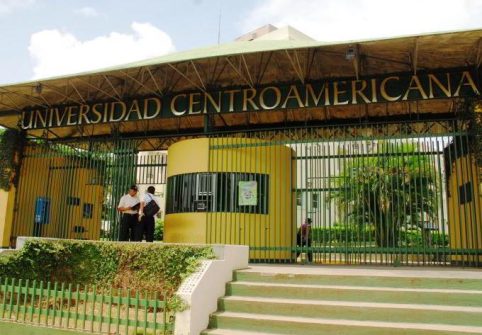An Unequal Economy.

Modest growth. A dramatic increase in remittances. Over a million people undernourished. Chinese domination. Political indoctrination in schools.
The Oriental Market in the capital Managua is the largest market in Central America. A large labyrinth where you can find everything. In one of the shops I met Dona Elvira Arua Pimeda, she has been working there for 25 years. She started when her mother owned the shop and now she owns it herself. But she doesn’t want her daughter to continue this tradition. She is selling 2 pounds of rice. “Before, people came and bought 20, 30 pounds, now, with the crisis we are experiencing, people are spending less and less and hunger is increasing. People are desperate, they don’t know what to do anymore. But the saddest thing is that there is no way out.” Dona Elvira shakes her head and sits down, waiting for a new customer.

Street children in the capital of Managua. More than 1.3 million people suffer from hunger in Nicaragua. File swm
What she says is also confirmed by the FAO. A reality that the Ortega-Murillo regime does not accept. Last February, the Government of Nicaragua announced its withdrawal from the Food and Agriculture Organization of the United Nations (FAO), ordering the “immediate” closure of its representation and offices in Managua. The decision followed the publication of the report “The State of Food Security and Nutrition in the World 2024“, which revealed that more than 1.3 million people suffer from hunger in Nicaragua. According to what was revealed, 19.6% of the Central American country’s total population suffer from this problem, with 15% of children under five experiencing growth retardation due to nutritional deficiencies. A situation that worsened from 2018 to 2020, when the UN body estimated that 17.8% of the population – 1.1 million inhabitants – were undernourished in Nicaragua.
From an economic point of view, according to economist Manuel Orozco, “Nicaragua continues to prove itself as a lagging economy, with a government determined to navigate between poverty and populism. Despite the propaganda of the Chinese buses, the country continues to live in a highly unequal economy.
This year it will register a rate of 3.8%.” Nicaragua’s economic growth is the result of a significant increase in remittances.

In 2024, Nicaragua received $5.243 billion in family remittances from abroad, equivalent to 29.4% of its gross domestic product (GDP). File swm
In 2024, Nicaragua received $5.243 billion in family remittances from abroad, equivalent to 29.4% of its Gross Domestic Product (GDP): an all-time record for the Central American country, according to the Nicaraguan Central Bank, and an increase of 12.5% compared to 2023.
Of this, $4.34 billion came last year from the United States, equivalent to 82.8% of the total, followed by Costa Rica with 7.5% and Spain with 5.8%. Remittances from these three countries represent 96.1% of the total.
Another economist who prefers to remain anonymous confirms: “Thanks to remittances coming mainly from the United States, Costa Rica and Spain, but also through drug trafficking and loans that financial institutions grant to the State and are used for repression and not for social projects. The international community has played an important role in helping to free a large number of political prisoners, but on the other hand, I think it has made a mistake because it continues to provide loans to the dictatorship. To repay these loans, the State dips into the pockets of Nicaraguans: it is as if they were paying to be tortured. I think the international community must also adopt more drastic measures against the army and the police: the apparatuses that support the dictatorship in power through murders, sieges and persecutions.”

China Mall, in Managua. Nicaraguan entrepreneurs and traders are suffering the most from this Chinese expansion. Photo from Social Media
China in Nicaragua
The free trade agreement between China and Nicaragua came into force on January 1, 2024, two years after the reestablishment of diplomatic relations between the two countries and the end of the Managua government’s relations with Taiwan. The agreement provides preferential tariffs for trade and promotes cooperation in some sectors, such as agriculture, textiles, tourism and logistics. According to data from the Nicaraguan Ministry of Industry and Trade, between January and October 2024, exports to China were only 1.05 percent of those to the United States, which is still the main trading partner of the authoritarian regime of President Daniel Ortega.
After this free trade agreement, there has been an expansion of a large number of Chinese retail stores, such as China Mall, China House, China Bazaar, The Star, Chinese Supermertain, and in the eastern market there are also plans to expand with Chinese capital. Nicaraguan entrepreneurs and traders are suffering the most from this Chinese expansion.

The former UCA University. Since 2021, 27 universities have been closed and confiscated. File swm
The crisis that is sinking Managua is not only political and economic but also cultural. Since 2021, 27 universities have been closed and confiscated. Hundreds of teachers have been fired and the students themselves denounce the poor qualifications of the new teaching staff. There is now a lack of concern about a trend of political indoctrination inside the classroom and attempts to limit freedom of thought. In the great prison that the country has become, any form of resistance is useful, even silence. (Open Photo: Carrying wood in the village. Shutterstock /Martin Corr)
N.A.R.



